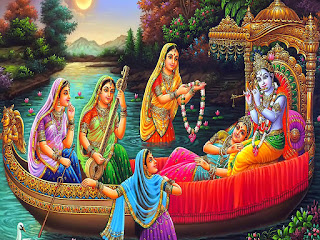Radha Radhika - Krishna (Devanagari: राधा, IAST: Rādhā) is the principal devotee of Krishna in the Bhagavata Purana, and the Gita Govinda of the Hindu religion. Radha is almost always depicted alongside Krishna and features prominently within the theology of today's Gaudiya Vaishnava religion, which regards Radha as the original Goddess or Shakti. Radha's relationship with Krishna is given in further detail within texts such as the Brahma Vaivarta Purana, Garga Samhita and Brihad Gautamiya tantra. Radha is also the principal object of worship in the Nimbarka Sampradaya, as Nimbarka, the founder of the tradition, declared that Radha and Krishna together constitute the absolute truth.
Radha is often referred to as Rādhārānī or "Radhika" in speech, prefixed with the respectful term 'Srimati' by devout followers. Radha is one of the most important incarnations of Goddess Lakshmi.
In the story of Krishna, as told in the Mahabharata and the Bhagavata Purana, he spends much of his youth in the company of young cow-herd girls, called Gopis in the village of Vrindavan. The Mahabharata does not describe Krishna's earlier life in Vrindavan in much detail, and focuses more on the later battle of Kurukshetra but within the Bhagavata Purana the child-hood pastimes of Krishna are described very vividly. Within the Bhagavata Purana, Radha is not mentioned by name but is alluded to within the tenth chapter of the text as one of the gopis whom Krishna plays with during his upbringing as a young boy. Krishna left Vrindavan for Mathura at the age of 10 years and 7 months according to Bhagavata Purana. So Radha is assumed to be also 10 years old or less when Krishna left Vrindavan.
Vaishnava tradition states that Radha was born in either Barsana, or Rawal, a village about 8 kilometers from Vrindavan, near present day New Delhi in India. There are a number of accounts of her parentage. Her father was the king of cowherds called Vrsabhanu. Vrsabhanu was a partial incarnation of Lord Narayana while her mother Kalavati was a partial incarnation of Goddess Lakshmi.
Her worship is especially prominent in Vrindavan, the place where Krishna is said to have lived over 5000 years ago. Wherein Her importance surpasses even the importance of Krishna. Radha's love for Krishna is held within Gaudiya Vaishnavism as the most perfect primarily because of its endless and unconditional nature. Thus she is the most important friend of Krishna, 'His heart and soul', and His 'hladini-shakti' (mental companion potency).
In the Brihad-Gautamiya Tantra, Radharani is described as follows: "The transcendental goddess Srimati Radharani is the direct counterpart of Lord Sri Krishna. She is the central figure for all the goddesses of fortune. She possesses all the attractiveness to attract the all-attractive Personality of Godhead. She is the primeval internal potency of the Lord."
Radha is often referred to as Rādhārānī or "Radhika" in speech, prefixed with the respectful term 'Srimati' by devout followers. Radha is one of the most important incarnations of Goddess Lakshmi.
In the story of Krishna, as told in the Mahabharata and the Bhagavata Purana, he spends much of his youth in the company of young cow-herd girls, called Gopis in the village of Vrindavan. The Mahabharata does not describe Krishna's earlier life in Vrindavan in much detail, and focuses more on the later battle of Kurukshetra but within the Bhagavata Purana the child-hood pastimes of Krishna are described very vividly. Within the Bhagavata Purana, Radha is not mentioned by name but is alluded to within the tenth chapter of the text as one of the gopis whom Krishna plays with during his upbringing as a young boy. Krishna left Vrindavan for Mathura at the age of 10 years and 7 months according to Bhagavata Purana. So Radha is assumed to be also 10 years old or less when Krishna left Vrindavan.
Vaishnava tradition states that Radha was born in either Barsana, or Rawal, a village about 8 kilometers from Vrindavan, near present day New Delhi in India. There are a number of accounts of her parentage. Her father was the king of cowherds called Vrsabhanu. Vrsabhanu was a partial incarnation of Lord Narayana while her mother Kalavati was a partial incarnation of Goddess Lakshmi.
Her worship is especially prominent in Vrindavan, the place where Krishna is said to have lived over 5000 years ago. Wherein Her importance surpasses even the importance of Krishna. Radha's love for Krishna is held within Gaudiya Vaishnavism as the most perfect primarily because of its endless and unconditional nature. Thus she is the most important friend of Krishna, 'His heart and soul', and His 'hladini-shakti' (mental companion potency).
In the Brihad-Gautamiya Tantra, Radharani is described as follows: "The transcendental goddess Srimati Radharani is the direct counterpart of Lord Sri Krishna. She is the central figure for all the goddesses of fortune. She possesses all the attractiveness to attract the all-attractive Personality of Godhead. She is the primeval internal potency of the Lord."
Maa Radha Rani
4/
5
Oleh
Chandu Numerology








































































